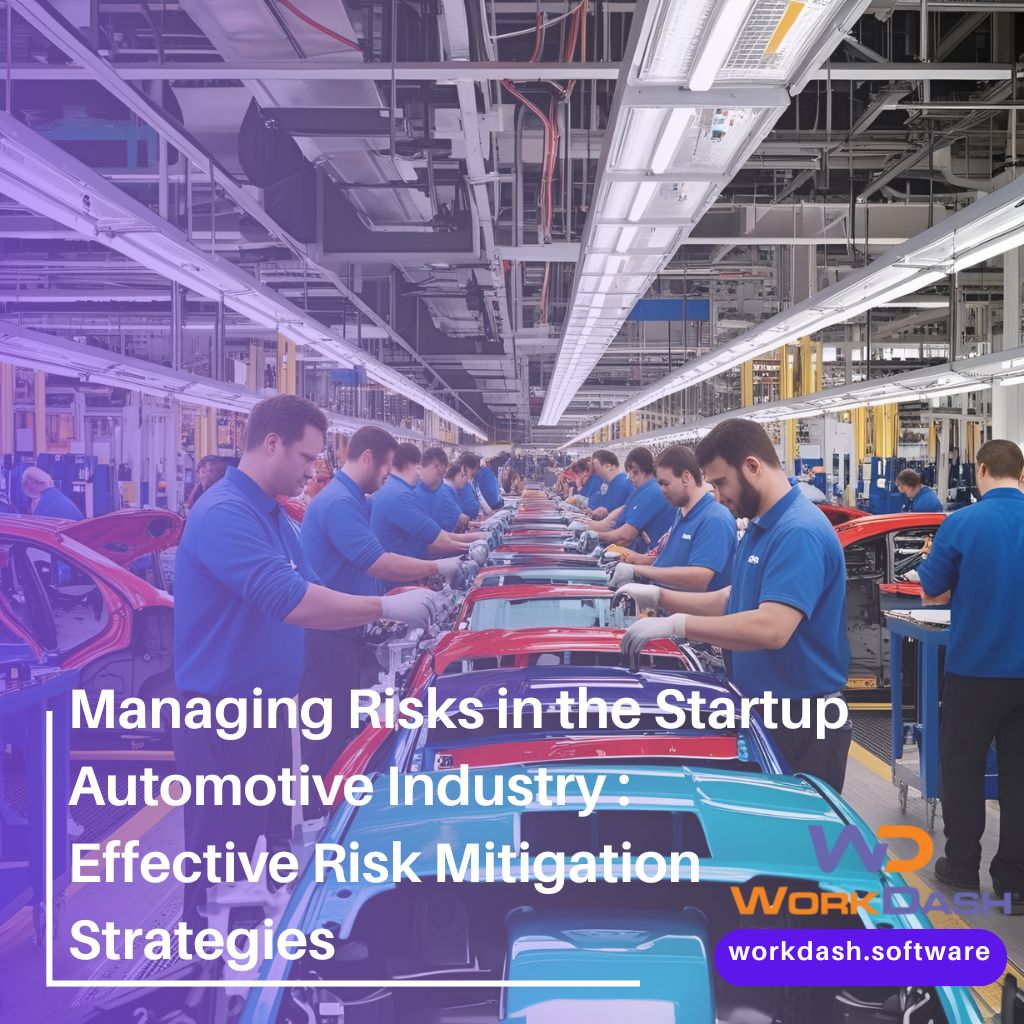Table of Contents
Starting a business in the automotive sector is a thrilling but complex venture, particularly for a startup. The automotive industry, with its high capital requirements, intricate supply chains, technological advancements, and strict regulatory frameworks, presents unique challenges. Effective risk management is paramount for automotive startups to navigate these challenges, secure their place in the market, and achieve long-term success in a rapidly evolving scenario.
In this article, we will examine automotive startups’ primary risk areas and explore effective strategies for risk identification and assessment to mitigate these risks. From financial challenges to cybersecurity threats, understanding and managing risk in the automotive industry is essential for building a resilient and competitive business, with transparency being a key indicator of success.
Key Risk Areas and Mitigation Strategies
Financial Risks
Risk: High Startup Costs, Difficulty Securing Funding, and Potential Cash Flow Problems
One of the most significant challenges for automotive startups is managing financial risks. The automotive industry is capital-intensive, requiring substantial investment in manufacturing, technology, marketing, and distribution. Securing funding is often challenging, particularly for new firms in the automobile industry without an established market presence. Additionally, cash flow problems can arise if revenue generation doesn’t align with the heavy upfront costs, leading to potential liquidity issues that require evaluation and influence strategic decisions.
Mitigation:
To mitigate financial risks, automotive startups must first develop a clear and detailed business plan. This plan should include financial projections that outline expected revenues, costs, and break-even points. A robust financial plan will not only help secure funding from investors, banks, or venture capitalists but will also serve as a roadmap for managing expenses effectively.
Startups should also explore multiple funding options. This could include venture capital, loans, grants, or even crowdfunding. It’s crucial to ensure that the funding structure is flexible, enabling the firm to adjust to short-term uncertainties in cash flow while maintaining sufficient working capital. Moreover, implementing strong cash flow management practices, such as monitoring accounts payable and receivable and keeping operating costs under control, will help avoid liquidity crises.
Operational Risks
Risk: Production Delays, Quality Control Issues, and Difficulties with New Technologies
The automotive industry is highly complex, involving intricate supply chains, precise manufacturing processes, and the integration of cutting-edge technologies. For startups, the risk of production delays, quality control failures, and difficulties with adopting new technologies can impede growth. Even slight delays or quality issues can lead to costly recalls and damage to a company’s reputation.
Mitigation:
To mitigate operational risks, startups should implement rigorous quality control measures throughout the production process. This includes establishing standard operating procedures (SOPs), conducting regular inspections, and using automated systems to monitor production processes. Additionally, investing in advanced technologies such as AI and machine learning can optimise production processes, reduce errors, and improve efficiency.
Employee training is also a key element in mitigating operational risks. As new technologies emerge, ensuring that employees are well-trained in handling and integrating these innovations can prevent operational hiccups. Deloitte recommends investing in workforce development, which will not only increase productivity but also enhance the firm’s ability to adapt to changes in the industry.
Regulatory Risks
Risk: Changing Environmental Regulations, Safety Standards, and Consumer Protection Laws
The automotive industry is subject to a myriad of environmental regulations, safety standards, and consumer protection laws. Changes in regulations—such as stricter emissions standards or evolving safety requirements—can have a significant impact on manufacturing processes and vehicle design. For startups, keeping up with these regulations while ensuring compliance can be challenging.
Mitigation:
To manage regulatory risks, automotive startups must stay informed about any regulatory changes that may affect their operations. This can be achieved through ongoing monitoring of local, national, and international regulatory bodies, as well as engaging with industry associations that advocate for regulatory clarity.
Developing compliance procedures and maintaining open lines of communication with regulatory authorities will help automotive startups adapt quickly to regulatory changes. Additionally, it is beneficial for startups to invest in legal expertise to ensure that all aspects of their business operations meet current regulations, avoiding fines and reputational damage.
Supply Chain Risks
Risk: Disruptions from Natural Disasters, Political Instability, or Labour Strikes
Supply chain risks are another critical area of concern for automotive startups, highlighting the need for a strategic approach to risk management. The global nature of the automotive supply chain means that disruptions in one region, due to natural disasters, political instability, or labour strikes, can have a ripple effect on operations worldwide. These disruptions can lead to delayed production, increased costs, and product shortages.
Mitigation:
To mitigate supply chain risks, it is advisable for automotive startups to diversify their supply chains and explore effective ways to enhance their resilience. This can be done by building relationships with multiple suppliers across different regions, reducing dependency on any single source. Additionally, startups should create contingency plans for potential disruptions. These plans should outline steps to secure alternative suppliers or production methods if the primary supply chain is disrupted, as advised by Fastmarkets.
By fostering flexibility within the supply chain, automotive firms can better navigate unexpected challenges and ensure continuous production and delivery.
Intellectual Property Risks
Risk: Patent Infringement or Theft of Trade Secrets
Intellectual property (IP) is a valuable asset in the highly competitive automotive industry. Risks such as patent infringement orade secrets can undermine a startup’s competitive edge. Protecting innovations in vehicle design, manufacturing processes, and new technologies is crucial for maintaining a market position in this environment the theft of tr.
Mitigation:
To mitigate IP risks, automotive startups should secure patents and trademarks for their innovations. This will protect the firm’s intellectual property from infringement and provide legal recourse if IP is misappropriated. In addition, implementing robust security measures to protect trade secrets—such as encryption, secure document storage, and access control systems—is essential.
It is also vital to establish strong legal protections, such as non-disclosure agreements (NDAs) with employees and suppliers, to prevent the unauthorized sharing of proprietary information, ensuring transparency in operations.
Cybersecurity Risks
Risk: Data Breaches, Hacking, and Disruption of Operations
As the automotive industry becomes increasingly digital, cybersecurity risks have grown significantly. Data breaches, hacking incidents, and cyberattacks that disrupt operations can have severe financial and reputational consequences. For automotive startups, ensuring robust cybersecurity is crucial to protecting both customer data and business operations.
Mitigation:
To mitigate cybersecurity risks, automotive startups must implement a comprehensive cybersecurity strategy. This includes deploying advanced encryption methods, firewalls, and intrusion detection systems to protect sensitive data. Regular vulnerability assessments should also be conducted to identify potential weaknesses in the system.
In addition, compliance with data privacy regulations, such as the General Data Protection Regulation (GDPR), will help protect consumer information and avoid costly fines. By proactively addressing cybersecurity risks, automotive startups can safeguard their data and maintain the integrity of their operations, ensuring the relevance of their enterprise in a competitive market.
Competitive Risks
Risk: Emergence of New Competitors, Technological Advancements, and Changing Consumer Preferences
The automotive industry is fiercely competitive, with constant technological advancements, shifting consumer preferences, and new market entrants. Emerging competitors, particularly those leveraging cutting-edge technologies like electric vehicles (EVs) or autonomous driving, can pose a significant threat to startups.
Mitigation:
To manage competitive risks, automotive startups must focus on continuous innovation and propose new solutions that meet market demands. This can involve investing in research and development (R&D) to stay ahead of technological trends and meet evolving consumer demands. Developing a strong brand identity, coupled with targeted marketing strategies, will help differentiate the startup from its competitors and influence stakeholder perceptions of its enterprise value.
Building customer loyalty is another essential strategy. By providing exceptional customer service, offering warranties, and maintaining a strong online presence, startups can foster lasting relationships with their customers and strengthen their market position.
General Risk Management Principles
Effective risk management is not just about identifying and mitigating risks but also about developing a culture of proactive risk management. Below are some key principles to guide startups in managing risk effectively, ensuring the relevance of their strategies in a dynamic market.
Identification:
Startups must systematically identify potential risks within the business to create a robust risk management matrix. This involves assessing both internal and external factors that could impact the company’s operations.
Analysis:
Once risks are identified, their probability and potential impact must be assessed using qualitative methods to better quantify the current risk. Understanding which risks pose the greatest threat will help in prioritising resources and efforts to address them.
Prioritisation:
Startups should focus on the most critical risks that could have the most significant impact on the business. By evaluating the risks based on their potential severity, startups can allocate resources more effectively.
Mitigation:
Once risks are prioritised, startups need to develop and implement strategies to reduce or eliminate the identified risks. These strategies should be tailored to the specific nature of each risk.
Monitoring:
Risk management is an ongoing process. Startups should continuously monitor the effectiveness of their risk management strategies and make adjustments as necessary.
How WorkDash’s Business Management Software Can Help Mitigate Risks for Automotive Startups
Running an automotive business, especially a startup, involves managing multiple risk factors across various areas of the business. From financial uncertainties to operational disruptions, managing risks effectively is key to long-term success. This is where WorkDash’s automotive business management software provides a systematic approach to risk management processes that can enhance operational efficiency. can be a game-changer for startups in the automotive industry. By offering a streamlined solution for everyday business operations, WorkDash helps mitigate risks and enhance overall efficiency.
How WorkDash Helps with Risk Management in Automotive Startups
Streamlining Operations and Reducing Operational Risks
In the automotive industry, operational risks—such as production delays, quality control issues, and problems with new technologies—can severely impact a startup’s ability to compete and grow, necessitating a comprehensive risk management process. WorkDash’s automotive business management software.
This approach to risk management helps mitigate these operational risks by centralising your daily tasks into one integrated platform.
WorkDash simplifies job management, inventory tracking, and scheduling, ensuring that all operational activities are organised and run smoothly. By providing a clear overview of all tasks, repairs, and customer bookings, automotive startups can avoid scheduling conflicts, reduce the risk of delays, and maintain high levels of service quality. The software’s ability to manage your parts inventory efficiently means you can ensure that there are no shortages or delays in parts delivery, which are common pain points in the automotive sector.
Financial Risk Management Made Easy
Financial risks are a major concern for any automotive startup, especially when it comes to managing cash flow, handling invoicing, and maintaining accurate financial records. WorkDash’s workshop software is designed to mitigate these financial risks by automating invoicing and offering real-time reporting. These features help reduce the time spent on administrative tasks and provide a clearer view of the company’s financial health, enabling more informed decision-making.
Additionally, by streamlining the financial management process, WorkDash ensures that startups can keep track of their spending, maintain profitability, and avoid cash flow problems—critical for new firms in the automotive industry.
Mitigating Regulatory Risks and Enhancing Compliance
The automotive industry is heavily regulated, with changes in environmental laws, safety standards, and consumer protection regulations impacting operations. For a startup, staying up to date with these regulations can be daunting. WorkDash helps automotive companies mitigate regulatory risks by offering easy-to-use tools for tracking compliance and maintaining necessary records.
The software provides tools for efficient job scheduling, enhancing the effectiveness of project implementation.
Job scheduling is a critical component of the risk management process to ensure timely project completion in the automotive sector.
Job scheduling is a critical component of the risk management process to ensure timely project completion in the automotive sector.Customer relationship management (CRM), inventory control, and risk assessment can assist in meeting regulatory requirements. This allows automotive startups to focus more on innovation and customer satisfaction, while WorkDash ensures that the business remains compliant with industry regulations.
Managing Supply Chain Risks with WorkDash’s Tools
Supply chain disruptions pose significant risks that require a systematic evaluation to ensure continuity in the automotive industry.
In the automotive industry, they can arise from unforeseen events such as natural disasters, political instability, or labour strikes. Startups with limited resources often lack the flexibility to deal with these disruptions efficiently, making risk identification even more crucial. WorkDash’s software supports better supply chain management by helping automotive companies maintain visibility into inventory levels and job statuses, which allows them to act quickly if supply chain issues arise.
With WorkDash, automotive startups can reduce the risks associated with supply chain inefficiencies by ensuring that parts are ordered in advance and that any delays or shortages are identified early, enhancing their risk response capabilities. Additionally, the software’s ability to centralise communication between different suppliers ensures that businesses can manage their supplier relationships effectively, reducing the likelihood of major supply disruptions.
Intellectual Property Protection and Security
For automotive startups, intellectual property (IP)—whether it’s new vehicle designs, proprietary software, or manufacturing techniques—represents a significant competitive advantage and must be protected through effective prevention strategies.
One of the risks that startups face is the theft of trade secrets or patent infringement, which can severely impact the business’s market position and influence stakeholder confidence in their current risk management practices.
WorkDash has a secure cloud-based system. The implementation of robust encryption methods and access control ensures that all sensitive business data, including client information, project plans, and financial records, are kept safe.
By safeguarding critical business information, WorkDash helps automotive startups reduce the risk of IP theft and ensures that only authorised personnel can access confidential data, thereby strengthening IP protection.
Enhancing Customer Relations and Mitigating Competitive Risks
In a competitive industry like automotive manufacturing, customer loyalty and strong relationships can provide a significant edge. WorkDash helps mitigate competitive risks by offering an integrated customer relationship management (CRM) system, which improves communication with customers and enhances service delivery.
By centralising customer data, automotive startups can gain valuable insights into customer preferences and trends, enabling them to tailor their offerings and stay ahead of emerging market demands. Additionally, the system helps track customer interactions, bookings, and feedback, ensuring that your business consistently delivers top-notch service. This proactive approach strengthens customer loyalty and positions your startup for sustainable growth in the competitive automotive market.
Facilitating Proactive Risk Management
Proactive risk management is all about anticipating potential issues before they arise and making informed decisions to prevent disruptions. WorkDash enables automotive startups to identify operational inefficiencies, track financial health, manage regulatory compliance, and ensure quality control, all in one platform. This comprehensive visibility into business operations allows for early detection of risks and timely response.
With real-time reporting, startups can analyse business performance across various metrics, identify areas of concern, and take action to mitigate risks quickly. This makes WorkDash a key tool in developing robust risk management strategiesThis strategic approach helps automotive companies stay resilient in the face of uncertainty.
Request a Demo Today
Interested in seeing how risk response strategies can enhance your startup’s resilience?
WorkDash can transform your automotive business? Subscribe for FREE today to experience the full range of features that can streamline your operations, reduce risks, and enhance your competitive edge.
Conclusion
Managing risks and their management in the startup automotive industry is essential for success. Automotive startups must proactively address financial, operational, regulatory, supply chain, intellectual property, cybersecurity, and competitive risks to ensure sustainability and growth, employing effective risk identification and response strategies. By implementing effective risk management strategies, startups can navigate the uncertainties of the automotive sector, enhance their resilience, and position themselves for long-term success.





